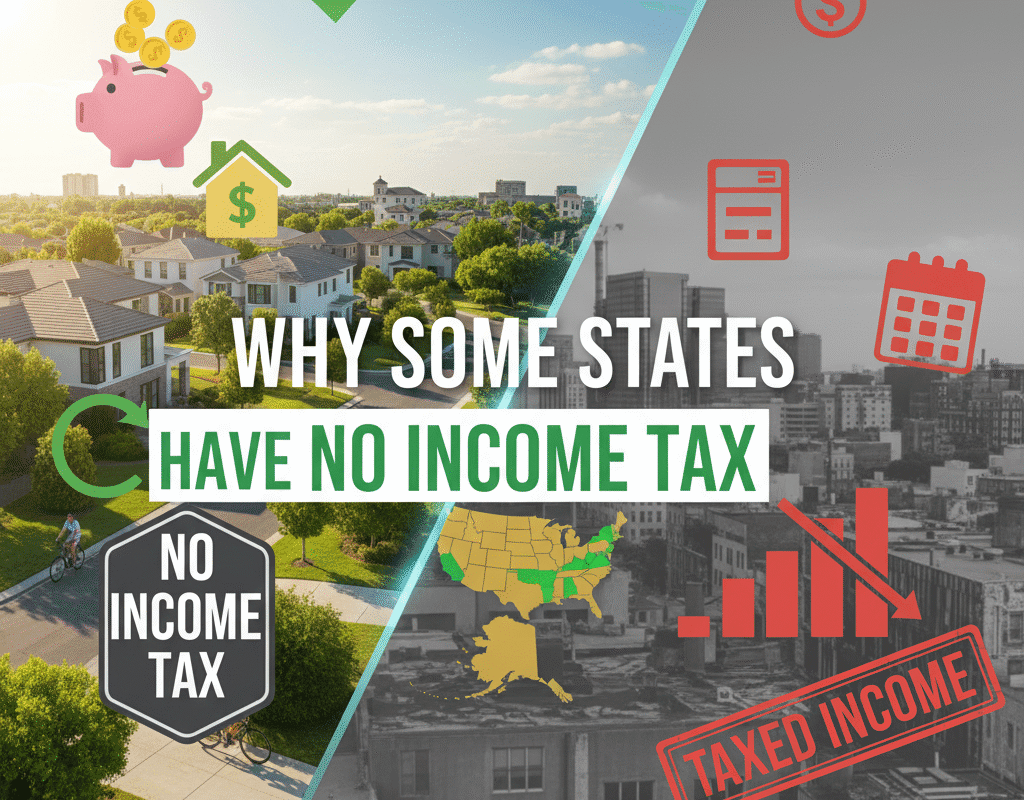Why Some U.S. States Have No Income Tax?
Why Some U.S. States Have No Income Tax?
When thinking about U.S. taxation, few things raise eyebrows quite like the fact that a number of states impose no personal income tax at all. For many workers, this sounds like a financial dream: keep more of your paycheck, avoid complex state tax filings, perhaps relocate for a better net income. But the reality is more nuanced. In this article for usacurrentaffair.com, we’ll examine why some U.S. states have no income tax, how they manage government spending without it, who benefits and what trade-offs are involved.
HSBC Cashback Credit Card 2025 – Benefits, Rewards & How to Apply?

Which States Have No Personal Income Tax?
As of 2025, nine U.S. states do not have a broad-based state personal income tax.
These states are:
- Alaska
- Florida
- Nevada
- New Hampshire
- South Dakota
- Tennessee
- Texas
- Washington
- Wyoming
For example, Washington does not tax wages and salaries at the state level (though it levies a capital gains tax for high earners in some situations).
New Hampshire used to tax interest and dividends until it phased that out by 2025.
These states stand out in the U.S. tax map — but no income tax does not mean no taxes or no public spending. Let’s dig deeper.
Why Do These States Choose to Go Without an Income Tax?
There are several key reasons why states shift (or decide) to have no income tax. These reasons include economic strategy, fiscal structure, natural resources, and political choice. Let’s break them down:
Economic competitiveness and migration dynamics
States without income tax often market themselves as business-friendly, low-tax destinations to attract people and companies.
The logic: if you don’t tax wages and salaries, you may attract more professionals, entrepreneurs and retirees who want to keep more of their earnings. That can boost state economic activity and property markets.
Revenue structure: compensating for the missing tax
Public services — education, infrastructure, health care, highways, local government — still need funding even if there’s no income tax. States without such tax often compensate by relying more heavily on alternative revenue streams: sales taxes, property taxes, excise taxes (on fuel, alcohol, tobacco), severance taxes (on natural resource extraction) and tourism-related revenues.
For example, Alaska relies substantially on oil and gas extraction taxes and federal subsidies, enabling it to maintain no personal income tax.
Political and constitutional factors
In some states, constitutions or statutes explicitly forbid personal income taxes. For instance, Texas’ constitution forbids a state personal income tax unless a super-majority of the legislature approves.
So the lack of income tax can be baked into law, making reversal difficult.
Resource wealth or other unique circumstances
Some states benefit from natural endowments (oil, mining, tourism) or high tourism/ gambling which produce revenue and reduce dependence on income taxes. For example, Alaska and Wyoming get large shares of revenue from resource extraction.
How Do States Pay for Services Without Taxing Income?
The state will need to find other ways to pay for its responsibilities if income taxes are eliminated. The primary approaches and associated trade-offs are listed below.
Different Tax Streams
- Sales tax and excise taxes: Many no-income-tax states compensate with higher sales tax rates and broad application (including to services). For example, in states like Tennessee and Washington, sales taxes and local sales tax burdens are above the U.S. average.
- Property tax: Some states shift more of the burden to property tax. For example, Texas is known for high property taxes compared to many other states.
- Severance taxes / resource taxes: States rich in natural resources (like Alaska, Wyoming) collect taxes from extraction (oil, gas, mining) so that residents don’t need to pay income tax.
- Tourism / gambling / service taxes: Some states with tourist industries (Nevada) leverage taxes on gaming, hospitality and entertainment to bolster revenues.
- Local government revenue shifts: Some no-income-tax states shift more spending responsibility (and revenue generation) to local governments rather than the state level.
Risks and Trade-Offs
- Increased burden on consumption or property: You may be subject to additional sales taxes, property taxes, or other levies even while you are exempt from income tax. Living expenses might not necessarily be cheaper.
- Volatility of revenue: States reliant on resource extraction or tourism may face more revenue volatility when commodity prices, travel or economic cycles change. For example, Alaska’s budget was hit when oil prices plunged.
- Service level issues: If overall spending is lower, infrastructure, education or health services may lag. The “no income tax” message can mask trade-offs in public service quality.
What the Information Shows
Eight states (including the unique situation of New Hampshire) do not currently levy a personal income tax, according to the Tax Foundation and other tax researchers.
According to Census Bureau data, states without income taxes have different per-capita spending and revenue levels; some rely on large property taxes or other sources, while others spend far less per person than states with income taxes.
According to migration studies, jurisdictions without income taxes are more likely to have net domestic in-migration, or persons relocating from other states, particularly from states with higher tax rates.
However, living in a state with no income tax does not guarantee a low overall tax burden. Cost of living and additional tax obligations (sales, real estate) are also important.
Why It Matters: For Locals, Retirees, and Companies
Living in a state with no income tax can have significant effects on a variety of groups.
For Residents Who Work
If you earn wages or salary, not paying a state income tax means you keep a larger portion of your gross income. That can boost disposable income or savings. But you still pay federal income tax, so the surcharge is only for the state portion.
A key question: What are the other tax burdens (sales tax, property tax, local taxes) and how is cost of living in that state? The net benefit depends on the full tax and living‐cost package.
Regarding Retirees
For retirees living on pensions, IRA/401(k) withdrawals, Social Security, investment income — residing in a state with no income tax can reduce state tax on that income (depending on state rules). For instance, pensioners may pay no state tax on their pension income if they live in a jurisdiction with no income tax.
For Businesses and Corporations
From an economic development perspective, states without personal income tax can promote themselves as attractive locations for employees and entrepreneurs. Lower personal tax rates can help recruitment of talent, especially for high‐earning professionals. The business climate may improve, but other taxes and regulatory environment matter a lot.
What Are a No-Income-Tax Model’s Drawbacks?
While not paying state income tax is attractive, the model isn’t without drawbacks. Here are some of the key negatives.
- Tax burden may simply shift: As noted, other tax types may increase. For example, some no‐income‐tax states have high sales or property taxes.
- Potential service issues: If revenue is lower or volatile, states may struggle to fund public education, infrastructure, health care or social services at levels comparable to higher‐tax states.
- Regressivity concerns: Income taxes can be structured to tax higher earners more, while consumption and property taxes are often proportionally heavier on lower-income households.
Final Thoughts: Why Some U.S. States Have No Income Tax
The idea of “no income tax” carries an undeniable appeal: more take-home pay, simpler tax filings, maybe a sense of financial freedom. Yet the reality is that states cannot simply waive income tax without making up the difference — either by spending less, taxing other things more, or tapping unique revenue sources. For individuals, it’s essential to remember that when one tax door closes, another may open (or widen).
Whether you are considering relocation, retirement planning, or simply trying to understand U.S. tax policy, the story of the income-tax-free states is a powerful example of how tax policy, migration, economic competitiveness and public services all interconnect.
How Bank Mergers Affect Consumers: What Every American Needs to Know in 2025
How Bank Mergers Affect Consumers: What Every American Needs to Know in 2025
